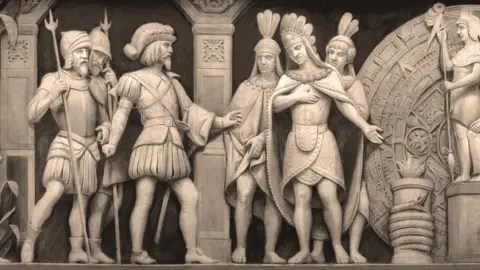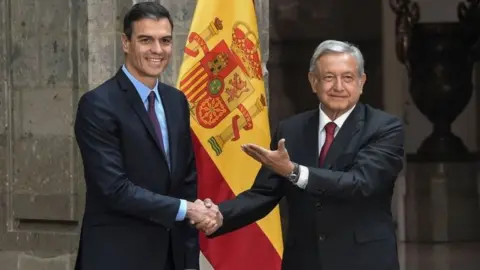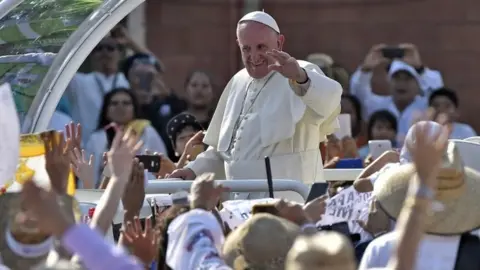Mexico demands apology from Spain and the Vatican over conquest
 Getty Images
Getty ImagesMexico's president has sent a letter to Spain's King Felipe VI and Pope Francis urging them to apologise for human rights abuses committed during the conquest of the region 500 years ago.
Andrés Manuel López Obrador said the indigenous peoples of Mexico had been the victims of massacres.
Speaking in the ruins of an ancient city, he called for a full account of the abuses.
Spain rejected his call and called for a "constructive perspective" instead.
The territory which now makes up Mexico was under Spanish rule for some 300 years before gaining independence in the early 19th Century.
At the time of the conquest, Spain was a fiercely Roman Catholic country and saw as its mission the spread of Christianity to regions such as the Americas.
Why does Mexico want an apology now?
The man who became Mexico's first leftist president in seven decades has been pursuing a radical agenda since being sworn in in December, promising to tackle corruption, reduce inequality and lift millions of Mexicans out of poverty.
On Monday, he tweeted a video address from an archaeological site in Comacalco, Tabasco, where he is shown speaking alongside the First Lady, Beatriz Gutierrez.
Allow Twitter content?

"I have sent a letter to the Spanish king [Felipe VI] and another letter to the Pope so that the abuses can be acknowledged and an apology can be made to the indigenous peoples for the violations of what we now call human rights," Mr López Obrador says.
"There were massacres... The so-called conquest was done with the sword and the cross. They raised churches on top of temples."
 AFP
AFP"The time has come to reconcile but first they should ask forgiveness," the president says.
Mexico has the world's second biggest Roman Catholic population, after Brazil.
Just over a fifth of Mexicans consider themselves to be indigenous but studies suggest many more have some pre-Hispanic ancestry.
When Spanish Prime Minister Pedro Sánchez visited Mexico in January he presented President López Obrador with his grandfather José Obrador's Spanish birth certificate, from 1893, AFP news agency reports.
What was the response?
The Mexican leader's relations with Spain's centre-left ruling party have been friendly but the government in Madrid promptly rejected his request for an apology.
"The arrival, 500 years ago, of Spaniards to present Mexican territory cannot be judged in the light of contemporary considerations," the government said in a statement.
"Our two brother nations have always known how to read our shared past without anger and with a constructive perspective."
There was no immediate comment from the Vatican but three years ago, on a visit to Mexico, Pope Francis asked indigenous people for forgiveness over the way they had been excluded from society.
 AFP
AFP"Some have considered your values, culture and traditions to be inferior. Others, intoxicated by power, money and market trends, have stolen your lands or contaminated them. How sad this is," he said.
"How worthwhile it would be for each of us to examine our conscience and learn to say, 'Forgive me!'"
What was the Spanish conquest of the Americas?
It started with an expedition led by Christopher Columbus in 1492.
The conquest of Mexico began in 1519 when a small army led by Hernán Cortés landed in the modern-day state of Veracruz.
Within two years, the Spanish had overcome the powerful Aztec Empire.
Their victory was attributed to the skilled leadership of Cortés, who made local allies for his campaign against the Aztecs, as well as their superior weapons.
Large numbers of indigenous people died in battle or in massacres such as that at Cholula, while diseases the Spanish inadvertently brought with them accounted for massive loss of life.
